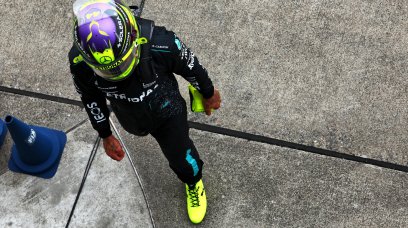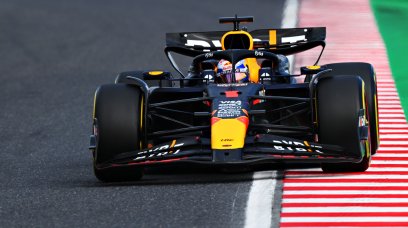Formula 1 has confirmed the 2022 calendar, with 23 races scheduled (subject to some agreements with individual circuits and homologation requirements). It's a dense calendar, given that racing will start in March and end in November, and results in plenty of double-headers and two triple-headers. Triple-headers were unheard of in Formula 1 until 2018, but have become increasingly commonplace as the calendar has expanded to a record 23 races in 2022. It's led to huge challenges for the teams, given the logistical demands of getting to races quickly and efficiently. But, more presciently, it's also led to some resistance from F1 team personnel who are now away from home for increasingly lengthy periods, with few opportunities to rest and relax. Given that Formula 1 now operates under severe budget restrictions, there's little option of staff rotation or 'relief crews' to help ease the burden on the rank and file crew members.
"If they don't like it, they should leave!"
While most of the team bosses have largely been diplomatic about the 23-race calendar, acknowledging the commercial demands of an increasingly popular sport, while trying to keep their staff happy, others have been more blunt. AlphaTauri's Franz Tost was particularly succinct when he tackled the subject over the Turkish Grand Prix weekend, saying that he views it as a 'take it or leave it' deal. "It's fantastic, [a] good job from Formula 1. I'm looking forward to it," he told media, including RacingNews365.com . "Regarding the people at the track, first of all, we are a race team. They all should be happy that we have as many races as possible and, of course, we take care of the people. For example, the mechanics after the race weekend have three days, four days off, where they can stay at home. Also press, marketing, that means all the people who are at the race track have some free days after the race weekend. "Engineers are a little bit more difficult but also, if I remember back in former times, they had to go after a race weekend to test which means that they always had to work there. "I think we all should be happy that we are in a position to be in Formula 1 and to have 23 races and, if someone doesn't like it, then he should go." Aston Martin's Otmar Szafnauer agreed with Tost's stance about the number of races, but was less blunt about how the team are viewing the stressful workload for their crew. "We do have to be mindful of all the people that travel, the mechanics and the engineers, and we've put operations in place, both back in the factory and at the racetrack, to make the travel as comfortable as possible for them," he commented. "Sometimes rotating people, and some other organisational changes back at the factory, such that the factory will do more of the jobs that the mechanics traditionally did at the track, in order to just make it a little bit more pleasant for them. "Any mental health issues, we have a traveling doctor as well with us, [so] we look after them as best we can." Ferrari's Laurent Mekies also took a more 'softly, softly' approach, saying that the Scuderia have put programmes in place to better support their staff. "We are building, season after season, a programme for the race team in order to stay in the best condition possible, and you add item after item," he explained. "So you start from the physical aspect, and then you go to the nutrition aspect, and then eventually we are also looking at the mental aspects to make sure that people have a good balance, and are staying in good shape and in good spirits. "I think all the teams are going to, inevitably, spend more and more energy on trying to keep their people in good shape for this long calendar. But it's something that is very well embraced by all involved, and I'm sure there will be further steps in the right direction." Szafnauer, as well as Mekies, both agreed that the number of triple-headers is tolerable for now, based on the circumstances that the COVID-19 pandemic has wrought on F1, but are hopeful that they can be removed once things are back to normal. "They still are very taxing on all of us, we have two of them next year and, hopefully, after the pandemic is truly behind us, we can look at the calendar and minimise or even even get rid of all the triple-headers," Szafnauer said. "The nice thing with next year is we start mid-March and finish mid-November, which gives us a decent winter break. You know you can put up with a triple-header or two if you know that you're not racing up to Christmas. Williams' Jost Capito added: "The triple-headers are quite hard on the teams. The guys are four weeks away from home, so it's always stressful. Everything that is less or shorter would help in that. But I think it is what it is."
Are more Sprint races the solution?
With Formula 1 pushing the Sprint Qualifying format heavily, and six of these events expected in 2022 , the compromise of having slightly fewer Grand Prix weekends but additional Sprint races could be the solution to everyone's concerns. Adopting a yearly format of 20 Grand Prix weekends, with 10 of them being Sprint events, would reduce the logistical challenges, and satisfy the commercial demands of the sport with more races overall. "We have more and more demand for F1," said Alfa Romeo's Frederic Vasseur. "We have to see it as a positive, that we don't have to complain about the fact that we are doing too many races, and so we are going into the direction to do a better championship with more races. It's a very positive message and, for sure, we have to find a solution to accommodate for everybody. But I take it as a positive message. "I think that this format is positive and I expect next year some races will be added to this format. The only negative I see is for rookies, because they have only one free practice session and then they go into the qualifying. This is not an easy one. We have to wait now after Sao Paulo. This is the third race weekend where we have this format, then ask also the fans how they see it, and then sit together and decide what we're doing in 2022." The format has met with the tacit approval of most of the team bosses, although there are calls for some tweaks. "I think we have to look [at] what creates more value for Formula 1 for the weekend," said Capito. "Having qualifying on the Friday, it's something exciting for the Friday, and the race is exciting as well. So I hear positive feedback." Haas team boss Guenther Steiner agreed, saying: "In general, I'm for it that we do more of these weekends which are Sprint Qualifying. If we can tweak it to make it better, if the fans like it more, I'm for it in the moment. It looks like it's positive on that side." Mekies said that it's a reasonable assumption that there will be more Sprint Qualifying races in 2022. "The main things we are careful with is to do it on a track where you actually have decent overtaking possibilities," he said. "Otherwise, it probably defeats the purpose a little bit. But, again, we'll see in Brazil. If you do it on three very different tracks like Silverstone, Monza and Brazil, it means that you can be reasonably confident that we can extend it further to a few more races next year."
Most read



















